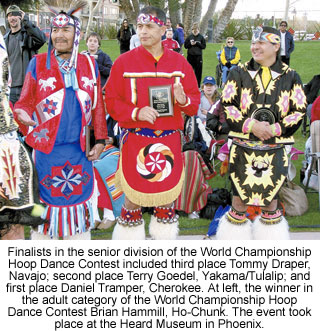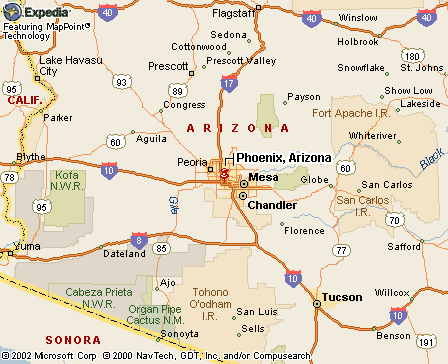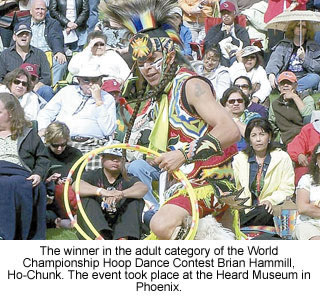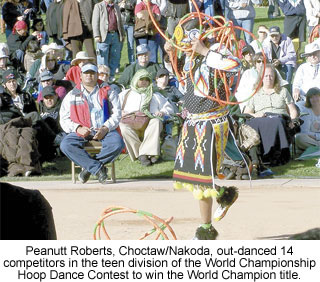 |
Canku Ota
|
 |
|
(Many Paths)
|
||
|
An Online Newsletter
Celebrating Native America
|
||
|
April 1, 2009 - Volume
7 Number 4
|
||
|
|
||
|
Ho-Chunk Man Wins
World Champion Hoop Dance Title
|
||
|
by Mary Kim Titla, Indian
Country Today correspondent
|
||
|
credits: Photos by Mary
Kim Titla
|
 PHOENIX
– Just one point separated the first, second and third place
winners in the adult division of the 19th Annual Heard Museum World
Championship Hoop Dance Contest in Phoenix, Ariz. PHOENIX
– Just one point separated the first, second and third place
winners in the adult division of the 19th Annual Heard Museum World
Championship Hoop Dance Contest in Phoenix, Ariz. The man who won, Brian Hammill, Ho-Chunk, came down with the flu before the contest, and despite a 101 temperature still competed, beating last year’s champion Charles Denny, Chippewa/Cree/Ute. “I dug really deep to be where I had to be. It’s a scary situation (to be that sick). I felt it, but I tried to hide it. (Winning) was very gratifying. I’ve been competing for 15 years and this is my first title. I’m the guy who barely missed it a couple of times,” said Hammill, who took home a $2,500 prize. Last
year, Denny, from Fort Duchesne, Utah beat Hammill of New River,
Ariz. by just three points. Third place winner was Nakotah LaRance,
Hopi/Tewa/Assiniboine. The 2008 Teen Champion Hoop Dancer Kevin
Duncan, Arikara/Hidatsa/Mandan/Apache, competed for the first time
in the adult division finishing in fourth place. The annual event drew 78 American Indian and First Nation hoop dancers who create routines with as few as four to as many as 50 hoops. This was the second highest number of hoop dancers who registered in 19 years of competition.
Other champions included: Beedoskah Stonefish, Grand Traverse Band of Ottawa/Chippewa of Interlochen, Mich. in the youth division (6 – 12 years); Peanutt Roberts, Choctaw/Nakodah of Atwood, Okla. in the teen division (13 – 17); and Daniel Tramper, Cherokee of Cherokee, N.C. in the senior division (40 and older). Finalists in the Tiny Tot division split the $200 prize money. Attendance was visibly lower than in past years. Weather and a sagging economy may be to blame. Still, the show lived up to its colorful and entertaining reputation. As explained in fliers handed out at the event, it has been suggested that the people of Taos Pueblo, N.M. first began performing a dance in which a performer passed through a hoop. Recently, the hoop dance has become more popular in dance circles, pow wows and contests throughout North America.
Hammill says the contest is like a family reunion for dancers. “We all get along really well; we see the children growing up. They’re (young dancers) bringing new formations. We learn from them and they learn from us. The new stuff is phenomenal.” Hammill, an accomplished dancer who formed his own dance group called Native Spirit, hopes the title will help him secure more bookings, but he says he won’t let it get to his head. “I will keep it grounded and keep the presentations as I’ve always given them in a dignified manner.” Hammill grew up in Wisconsin, but currently lives in Arizona. |
 Phoenix, Arizona map |
www.expedia.com |
|
|
||
|
|
||
| Canku Ota is a free Newsletter celebrating Native America, its traditions and accomplishments . We do not provide subscriber or visitor names to anyone. Some articles presented in Canku Ota may contain copyright material. We have received appropriate permissions for republishing any articles. Material appearing here is distributed without profit or monetary gain to those who have expressed an interest. This is in accordance with Title 17 U.S.C. Section 107. | ||
|
Canku Ota is a copyright ©
2000, 2001, 2002, 2003, 2004, 2005, 2006, 2007, 2008, 2009 of Vicki
Barry and Paul Barry.
|
||
 |
 |
|
|
The "Canku
Ota - A Newsletter Celebrating Native America" web site and
its design is the
|
||
|
Copyright ©
1999, 2000, 2001, 2002, 2003, 2004, 2005,
2006, 2007, 2008 of Paul C.
Barry.
|
||
|
All Rights Reserved.
|
||
 For
some families, like Duncan’s, hoop dancing is a family event
with siblings competing against each other. Five members of the
Duncan family competed in three events. Hammill’s two children
also danced in the Tiny Tot division.
For
some families, like Duncan’s, hoop dancing is a family event
with siblings competing against each other. Five members of the
Duncan family competed in three events. Hammill’s two children
also danced in the Tiny Tot division. Each
dancer was judged for precision, timing/rhythm, showmanship, creativity
and speed. The five judges were former hoop dancers hailing from
South Dakota, North Carolina, Colorado, Oklahoma and New Mexico.
Each
dancer was judged for precision, timing/rhythm, showmanship, creativity
and speed. The five judges were former hoop dancers hailing from
South Dakota, North Carolina, Colorado, Oklahoma and New Mexico.